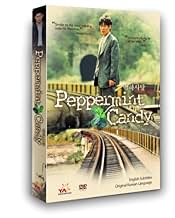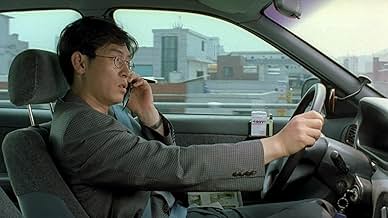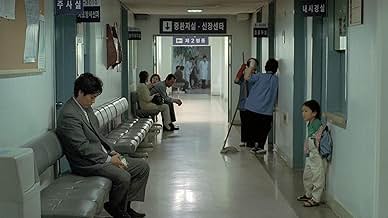NOTE IMDb
7,6/10
12 k
MA NOTE
Après le suicide d'un homme, le temps remonte pour révéler six chapitres de sa vie sur les raisons pour lesquelles il s'est suicidé.Après le suicide d'un homme, le temps remonte pour révéler six chapitres de sa vie sur les raisons pour lesquelles il s'est suicidé.Après le suicide d'un homme, le temps remonte pour révéler six chapitres de sa vie sur les raisons pour lesquelles il s'est suicidé.
- Récompenses
- 18 victoires et 6 nominations au total
Ko Seo-hie
- Kyung-ah
- (as Seo-hie Ko)
Park Ji-yeon
- Female student
- (as Ji-Yeon Park)
Kim Kyeong-ik
- Myung-sik
- (as Kim Gyeong-ik)
Jeong Woo-hyeok
- Corporal Park
- (as Woo-hyeok Jeong)
Bae Jang-soo
- Camera shop owner
- (as Jang-soo Bae)
Avis à la une
'Peppermint Candy' doesn't always make for comfortable viewing, particularly at the beginning of the film when the protagonist is in such a deranged state, but Lee Chang-dong's clever story-telling traces events backwards to show how brutal life and political events can dismantle a human being. This was only his second major feature (made in 1999), but the South Korean film maker and cast draw you in ... you can't turn away however unpleasant it gets ... utterly compelling!
At the beginning and at the end of the film I did not like his character and his horrible nature. but a good story. at the beginning of the storyline presented by people who are very depressed and suicidal, we will be presented with a flow of flasback back to the steps of the past, step by step from various character changes and behavioral conditions experienced.
I was curious that I read on the internet this film raised the issue of tragic events in 1980 (Gwangju Murder) through individual figures. Through this film, the director seems to want to illustrate the dramatic effect of the cruel event, the victims were not only civilians, but also "perpetrators", soldiers who had just carried out orders.
we can be prejudiced about this film but we can reflect on life that someone's future that might be destroyed can also be formed by a dark past.
while it may take being Korean (and being part of the "386-generation" that really went through all the turbulent events of this movie's timeline) to fully appreciate this movie, it is nevertheless a powerful, graphic, and grippingly emotional commentary on South Korea of the the last twenty years. Director Chang-dong Lee masterfully presents the plot in reverse chronological order, and protagonist Kyung-gu Sol handily goes from broken buisnessman to lovesick schoolboy by the movie's end/his troubled road's beginning. In a way, this movie is perhaps Korea's unique and tragic answer to a movie like "Forrest Gump." "Na ottoke" ("what do I do?") - indeed, what does one do when faced with such experiences? Easily one of the best Korean movies I've seen to date.
This is film art that makes no concessions to 'entertainment'. A man commits suicide at the start of the film. Then the filmmaker brilliantly flashes his life before us in short scenes moving backwards in time. The emotional power of each scene is built on our knowledge of what is yet to come for this corrupted and despairing man. And that power keeps intensifying, reaching an almost unbearable level of sadness and empathy. Not since Sophie's Choice have I seen a film so unflinching in its despair. Everything about this film demonstrates greatness: the screenplay, the cinematography, the performances, the wisdom and humanity. It's not an easy film and there were many walk-outs the night I saw it at the New Directors Festival in New York, but it will stand the test of time. Should be required viewing for every 18-year-old.
I saw this movie in a college class, and it's possible to have an entire lecture on it. Unfortunately, my professor only had about twenty minutes, though I'm sure he would've loved a couple hours.
Granted, the subtitles weren't the greatest. Being Korean, I had a much easier time understanding everything, because if there was something I couldn't quite understand in Korean, I had the subtitles to help me along.
To paraphrase my professor, this movie isn't just about the story of one man, but how this one man's life signifies the past fifty years of Korean history as well, a people subject to the influences of forces greater than they.
To give a quick Korean history lesson, for the first half of the century, the Koreans were brutally subjugated by the Japanese, who not only wanted to colonize it, but to assimilate the people and culture completely into their own. Then came WW2, and following that, the start of the Cold War conflicts, beginning of course with the Korean War, where brother fought brother and a people was torn apart.
The second half of the century, following the Korean War, has been defined by dictatorships, as the oppressive Korean government put down democratic student movements, as seen in part of the film. It is only recently that true democracy has begun to form and strengthen.
The main character of the movie is shown in the beginning, a ruined man, and one can assume from following sequences, shown in backwards chronological order, that he is an evil and corrupt man. However, the purpose of the movie is to show how he was corrupted by larger forces, mirroring the Korean people's own search for their lost innocence. It is in the seemingly mundane scenes of his life that we see how trite and ordinary violence and depravity have become, yet we also travel back to see where every part of him came from.
I'm sure I could say a lot more, but basically it's about a lot more than the story of one man, and the seemingly irrelevant stories of his life signify more about both him and the Korean people as a whole. Terrific movie.
Granted, the subtitles weren't the greatest. Being Korean, I had a much easier time understanding everything, because if there was something I couldn't quite understand in Korean, I had the subtitles to help me along.
To paraphrase my professor, this movie isn't just about the story of one man, but how this one man's life signifies the past fifty years of Korean history as well, a people subject to the influences of forces greater than they.
To give a quick Korean history lesson, for the first half of the century, the Koreans were brutally subjugated by the Japanese, who not only wanted to colonize it, but to assimilate the people and culture completely into their own. Then came WW2, and following that, the start of the Cold War conflicts, beginning of course with the Korean War, where brother fought brother and a people was torn apart.
The second half of the century, following the Korean War, has been defined by dictatorships, as the oppressive Korean government put down democratic student movements, as seen in part of the film. It is only recently that true democracy has begun to form and strengthen.
The main character of the movie is shown in the beginning, a ruined man, and one can assume from following sequences, shown in backwards chronological order, that he is an evil and corrupt man. However, the purpose of the movie is to show how he was corrupted by larger forces, mirroring the Korean people's own search for their lost innocence. It is in the seemingly mundane scenes of his life that we see how trite and ordinary violence and depravity have become, yet we also travel back to see where every part of him came from.
I'm sure I could say a lot more, but basically it's about a lot more than the story of one man, and the seemingly irrelevant stories of his life signify more about both him and the Korean people as a whole. Terrific movie.
Le saviez-vous
- AnecdotesSeo-hie Ko's debut.
- ConnexionsReferenced in Making Memories of Murder (2004)
- Bandes originalesCatch the Rainbow
Written & Performed by Ritchie Blackmore and Ronnie James Dio
(Blackmore and Dio are member of Rainbow)
Meilleurs choix
Connectez-vous pour évaluer et suivre la liste de favoris afin de recevoir des recommandations personnalisées
- How long is Peppermint Candy?Alimenté par Alexa
Détails
- Date de sortie
- Pays d’origine
- Site officiel
- Langue
- Aussi connu sous le nom de
- Bonbon à la menthe
- Sociétés de production
- Voir plus de crédits d'entreprise sur IMDbPro
Box-office
- Montant brut mondial
- 89 184 $US
Contribuer à cette page
Suggérer une modification ou ajouter du contenu manquant

Lacune principale
By what name was Peppermint Candy (1999) officially released in Canada in French?
Répondre


























